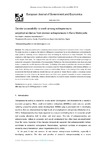Gender Accessibility to Credit Among Entrepreneurs: Empirical Evidence From Women Entrepreneurs in Kano Metropolis

View/
Use this link to cite
http://hdl.handle.net/2183/31383
Except where otherwise noted, this item's license is described as Atribución-NoComercial 4.0 Internacional (CC BY-NC 4.0)
Collections
Metadata
Show full item recordTitle
Gender Accessibility to Credit Among Entrepreneurs: Empirical Evidence From Women Entrepreneurs in Kano MetropolisDate
2022-06-28Citation
Bashir, R., & Danlami, A. (2022). Gender accessibility to credit among entrepreneurs: Empirical evidence from women entrepreneurs in Kano Metropolis. European Journal of Government and Economics, 11(1), 97-112. https://doi.org/10.17979/ejge.2022.11.1.8198
Abstract
[Abstract] This study was carried out to empirically assess women entrepreneurs’ access to credit in Kano metropolis. The study was aimed at analyzing the maximum willingness to accept loans by women entrepreneurs and exploring the major problems hindering women entrepreneurs from fundraising for businesses in Kano Metropolis. The study employed a multi-stage random sampling to select a total of three hundred and seventy-six (376) women entrepreneurs as the sample of the study. The analysis of the data was carried out using frequency count and simple percentages to analyze the demographic characteristics of the respondents. Furthermore, the inferential statistics were done using logit models to capture the specific objectives of the study. The findings of the study revealed that high interest and collateral requirement prevent women entrepreneurs from accessing a loan from financial institutions, while religious affiliation is a major factor affecting women entrepreneurs' access to credit facilities. Based on the findings of the study, the study recommends that financial institutions should introduce and operate an Islamic finance system to encourage women entrepreneurs to go for a loan as the interest rate is one of the most important constraints to women entrepreneurs seeking financial credits. Additionally, collateral demand attached to a loan for women should be removed to encourage women entrepreneurs to raise capital.
Keywords
Women
Gender
Entrepreneurs
Finance
Credit accessibility
Gender
Entrepreneurs
Finance
Credit accessibility
Editor version
Rights
Atribución-NoComercial 4.0 Internacional (CC BY-NC 4.0)
ISSN
2254-7088






